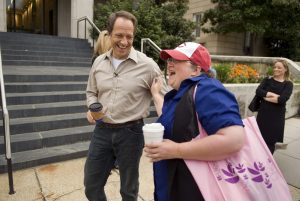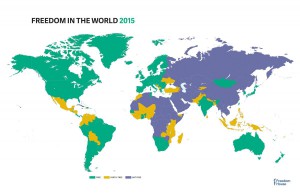


In January, I wrote about the Central Plains wildfires as a very personal crisis in my Oklahoma hometown.
I underscored the importance of subsidiarity, which is the idea that a central authority should perform only those tasks which cannot be handled effectively at a more immediate or local level. I’ve now had opportunity to practice subsidiarity in Oklahoma. And I can tell you, it’s harder to do than to talk or write about in the abstract.
The preceding months of drought had created a tinderbox that fueled fires that burned out thousands of Oklahoma and Texas families, including hundreds in my home town and surrounding counties. As the wildfires burned, an upscale West Michigan children’s clothing resale shop was seeking a donation location for 2,000 pieces of clothing. The need was obvious. The Effective Compassion staff at Acton now had opportunity to support local helpers in the wildfire areas, to literally equip an exercise in subsidiarity.
In politics and in society, the principle of subsidiarity represents one of the bulwarks of limited government and personal freedom. My humble, small-town Oklahoma mother can understand that. But in the wake of unprecedented national disasters, such mon sense can be overrun with the lure of government relief money. The bureaucratic morass of FEMA hurricane response should warn us off such temptations.
The “let the government do it” attitude springs eternal with this culture, despite obvious and continued failure. However, the “let the locals do it” approach requires more of the locals — and in this case of clothing to needy Oklahoma neighbors, that meant me.
The picture of Mari Kuhn, Acton’s Effective Compassion program manager, and me lugging huge garbage bags of clothing from the resale shop and stuffing them into a big SUV ical at best. The significance of these two older moms exercising their “clothes police” authority (too short, too low, too little material) as the clothing was moved from bags to shipping boxes did not go unnoticed by teenage helpers. Multiple emails, phone calls, and dead-end solicitations were required before finally securing those boxes and gratis trucking services to move 36 shipping boxes from Grand Rapids to Seminole, Okla. pany moved the boxes to Arkansas, and their supportive staff recruited yet another pany to move the boxes to Oklahoma. (Note to self: provide information so that the nonprofit organization receiving these clothes sends the appropriate IRS in-kind receipt to both panies. And make sure that the pastor knows when he has to be available for the delivery — and shows up.)
Loaded boxes were put on a palette, shrink wrapped, and then awaited the trucking schedule that would work. Multiple calls to munity recipient organizations required connecting sound economics and passion. No, the clothing would not be given to a group that simply opens its doors and provides free clothing to anyone in need — with the needy self-selecting. Subsidiarity requires discernment; undercutting the local clothing sales businesses would be bad economics.
Once we connected to a local church in Oklahoma with appropriate storage facilities and a larger mitted to distribute the clothing to a broad area of needy families, our subsidiarity exercise appeared to hold some promise. But to be the best use to divergent groups — burned out families with children, a local domestic violence shelter and a prisoner re-entry family support program — all 36 boxes had to be sorted.
I live in Michigan. If I was going to make this particular subsidiarity exercise work in my home town, I had to go to Oklahoma. And I needed to recruit help for a significant six hour job to make the effort even more local. I did both.
Perhaps we don’t say “subsidiarity” much because we don’t practice subsidiarity enough. We remain delusional about government resources and capacities. Subsidiarity requires mitment to neighbors mitment that should be more visible in our civil society. The talk about subsidiarity isn’t so important. The doing is.









